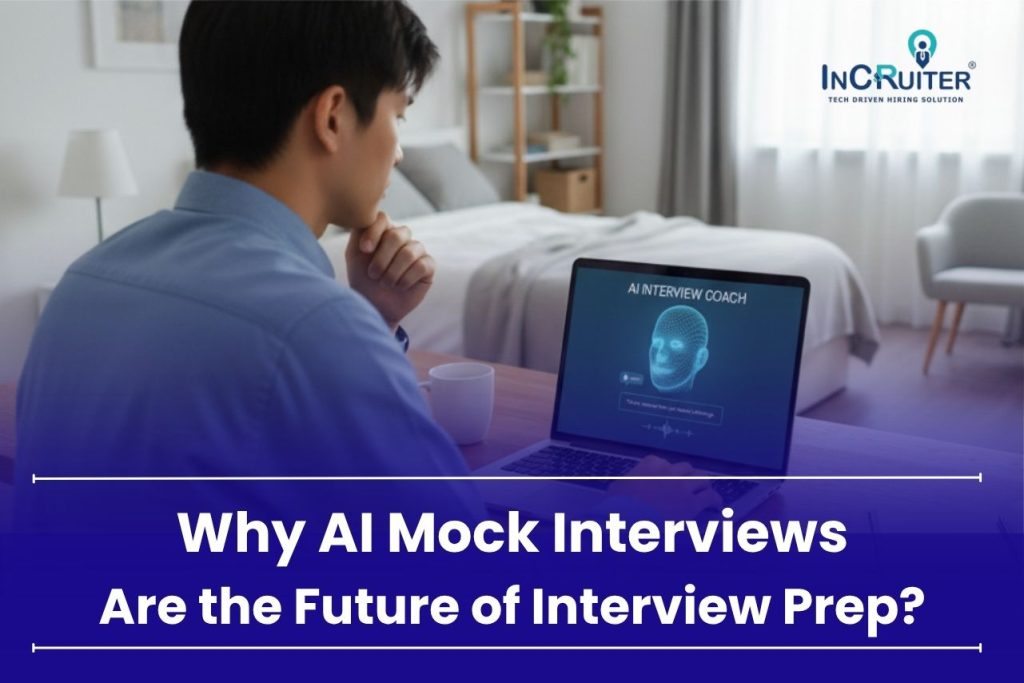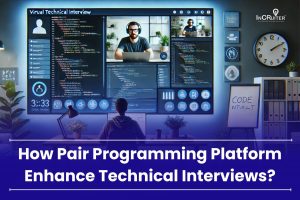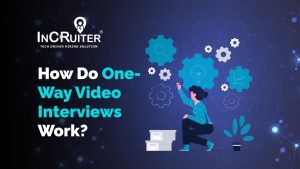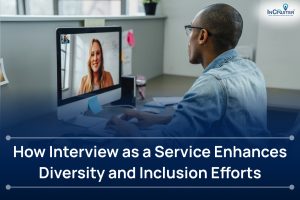
Interview preparation has moved far beyond mock sessions with friends or costly coaching classes. Today’s candidates demand personalized, always-available, and feedback-driven practice that keeps pace with how fast hiring itself is changing.
According to a recent report, over 67% of students and early-career professionals now prefer AI-powered tools for interview readiness because they provide instant evaluation and realistic practice. Artificial Intelligence is already transforming education and hiring, and mock interviews are no exception.
With Conversational AI bots simulating real interviews, automated feedback engines analyzing responses, and adaptive systems tailoring questions by role, AI mock interviews are redefining the preparation journey.
This blog explores why AI mock interviews are the future of interview prep and what makes them game-changing for candidates and employers alike.
The Limitations of Traditional Mock Interviews
While traditional mock interviews have long been a staple in placement training and career prep, their structure exposes several technical inefficiencies that make them less scalable, less accurate, and less data-driven in today’s hiring landscape.
1. Non-Scalable Delivery Model
Traditional mock interviews rely on human availability. Each session requires manual coordination between the candidate and mentor, which does not scale when thousands of students are preparing simultaneously for campus placement drives. Unlike an AI mock interview simulator, there is no automation to handle high concurrency.
2. Feedback Without Analytics
Human feedback is inherently qualitative and subjective. Candidates receive anecdotal insights (“you seemed nervous” or “answer was too long”) but lack quantitative benchmarks such as tone analysis, speech clarity scores, response timing, or role-specific knowledge coverage. This absence of structured performance data prevents iterative improvement.
3. Latency in Iteration
With traditional methods, a candidate might wait days for a peer, mentor, or coach to be available again. This creates high latency in feedback loops, reducing the effectiveness of deliberate practice. Modern AI-powered mock interviews can generate real-time AI interview feedback, enabling faster learning cycles.
4. Cost and Resource Inefficiency
Running large-scale traditional mock interviews requires significant manpower and infrastructure (faculty, external trainers, or professional services). This makes it cost-prohibitive for students and freshers, especially compared to AI mock interview free platforms that democratize access at near-zero marginal cost.
5. Failure to Replicate Real-World Interview Dynamics
Traditional mock interviews often recycle predictable question sets. They lack adaptive engines that introduce dynamic question variation based on a candidate’s previous responses. This results in overfitting, as students train for expected inputs rather than learning to handle real recruiter unpredictability.
6. No Data Retention or Longitudinal Tracking
Mock interviews conducted in offline or one-time online setups do not retain structured data for long-term analysis. Candidates cannot track progress across multiple attempts, nor can institutions aggregate performance data at scale. This absence of analytics dashboards, historical logs, and question-level insights makes traditional mock interviews an isolated event rather than a continuous learning cycle.
What Are AI Mock Interviews?
AI mock interviews provide a fully automated interview preparation experience, where a conversational AI bot simulates fundamental interviewer interactions. Candidates can practice independently, anytime, without needing human support. The system asks tailored questions, evaluates answers, and delivers instant feedback on clarity, confidence, and technical depth, helping individuals refine their skills, build confidence, and be better prepared to ace actual job interviews.
How AI Mock Interviews Are Transforming Interview Prep?
Interview preparation has shifted from informal peer practice and expensive coaching sessions to fully automated AI-driven simulations.
Here’s how AI mock interviews are reshaping the process:
1. 24/7 Availability
No more chasing mentors or waiting for weekend slots. With AI mock interviews, the AI interviewer is always awake, always ready. Whether it’s 2 a.m. before a big academic assessment or dawn on placement day, candidates can summon a fully simulated recruiter in seconds, removing time as an excuse for under-preparation.
2. Realistic Simulation
Traditional prep often feels rehearsed, but reality isn’t so kind. A Conversational AI bot shifts gears mid-session, pressing deeper when answers sound shallow, tossing curveball behavioral questions, or switching into technical drill mode. This unpredictability mirrors real recruiters, ensuring candidates learn adaptability instead of clinging to memorized scripts.
3. Instant Feedback
Instead of vague comments like “be more confident,” AI dissects responses with precision. It highlights filler words, tracks hesitation patterns, and even scores tone modulation. Candidates no longer wonder what went wrong; AI sees it quantified in real time, with tailored insights that guide their very next attempt, not weeks later.
4. Role-Focused Prep
Every job demands a different playbook. A fresher chasing campus placement needs HR warmups, while a developer eyeing a tech giant must endure live coding rounds. AI draws from curated question banks, serving hyper-relevant practice sessions. This ensures preparation isn’t generic, it’s laser-focused on the skills that matter most.
5. Affordable & Accessible
Interview coaching has long been a privilege, expensive, urban-centered, and often out of reach. AI interview prep bots flip this script. With free or low-cost simulations available online, even candidates from small towns gain access to professional-grade prep. Democratization isn’t a buzzword here; it’s the end of gatekeeping in interview readiness.
6. Faster Skill Development
Progress thrives on repetition, but only if feedback is immediate. With an AI interview preparation bot, a candidate can attempt five practice interviews in one evening, each scored, each analyzed. Over time, small adjustments stack into major improvements. What once took months with sporadic mock sessions now compresses into weeks of measurable growth.
7. Confidence Building
Anxiety thrives in the unknown. By simulating interview pressure repeatedly, the AI mock interview bot turns nerves into muscle memory. When the real recruiter asks a tough question, candidates feel an odd familiarity as if they’ve faced this moment before. Confidence stops being a pep talk; it becomes a practiced reflex, built through repetition.
Also Read: Mock Interview for Freshers: Get Ready to Land Your Dream Job
The Future of Interview Preparation
Tomorrow’s interview prep won’t be confined to video calls or practice bots; it will be immersive, intelligent, and hyper-personalized. Here’s where the industry is heading:
1. AR/VR Interview Simulations
Imagine wearing a headset like Apple Vision Pro and walking into a virtual boardroom where AI avatars replicate recruiters. Candidates can rehearse not just answers, but also body language, eye contact, and spatial awareness, building confidence in an environment nearly identical to real-world interview settings.
2. AI-Driven Conversational Agents
Tools like InCruiter’s IncMock or Google’s Interview Warmup are early signals of what’s coming: conversational AI interviewers that can probe, adapt, and evaluate. Future iterations will combine voice, sentiment analysis, and facial recognition to provide deeper, more human-like simulations.
3. Holographic Interview Prep
Emerging hologram technology (e.g., Microsoft Mesh) will allow candidates to practice with life-sized holographic interviewers. This bridges the gap between video prep and face-to-face sessions, making the experience more natural for roles where presence and communication matter.
4. Gamified AI Interview Training
Platforms are beginning to integrate game mechanics, leaderboards, challenges, and rewards to keep students and freshers engaged. Future systems may use adaptive AI algorithms to progressively increase question difficulty, ensuring preparation feels like leveling up in a game, rather than a dull Q&A.
5. AI-Powered Skill Graphs
Beyond just interviews, companies will leverage AI-driven skill mapping to match candidate strengths against job requirements. Mock interviews won’t just train; they will predict role fit and recommend targeted learning modules, creating a closed loop between prep and hiring outcomes.
Also Read: Mock Interview for Freshers: Get Ready to Land Your Dream Job
Conclusion
The future of interview preparation is no longer dependent on human availability or generic coaching. AI mock interviews provide a fully automated, intelligent, and role-specific practice environment where candidates sharpen communication, coding, and behavioral skills with instant feedback.
For students and freshers, this means affordable access to structured preparation; for employers and institutions, it ensures a pipeline of interview-ready talent. By bridging candidate needs with recruiter expectations, AI mock interviews transform preparation into measurable outcomes.
Discover how InCruiter’s AI Mock Interview platform empowers candidates to prepare smarter and helps organizations build stronger hiring pipelines.
AI mock interviews are simulated interview sessions powered by artificial intelligence that mimic real interview conditions. They use AI to generate questions based on job roles, evaluate your responses, and deliver instant feedback on communication style, confidence, and technical accuracy. This helps candidates prepare more effectively than traditional mock interviews by offering personalized practice anytime and anywhere.
Ready to Transform Your Hiring Process?
Discover how our AI-powered interview platform can streamline your recruitment and find the best candidates faster.





